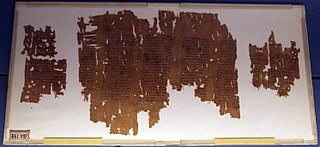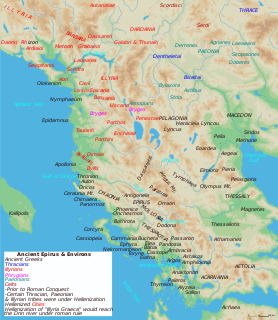Related Research Articles
Theopompus was a Greek historian and rhetorician.
Marvel may refer to:
Leotychidas was a ruler of Sparta in 491–476 BC. He led Spartan forces during the Persian Wars from 490 BC to 478 BC.

Dystos is the name of a lake, village and former municipality in Euboea, Greece. Since the 2011 local government reform it is part of the municipality Kymi-Aliveri, of which it is a municipal unit. The municipal unit has an area of 162.431 km2. The seat of the municipality was Krieza.

Hellenica (Ἑλληνικά) simply means writings on Greek (Hellenic) subjects. Several histories of fourth-century Greece, written in the mold of Thucydides or straying from it, have borne the conventional Latin title Hellenica. The surviving Hellenica is an important work of the Greek writer Xenophon and one of the principal sources for the final seven years of the Peloponnesian War not covered by Thucydides, and the war's aftermath.

Caranus or Karanos was the first king of the ancient Greek kingdom of Macedon according to later traditions. According to Herodotus, however, the first king was Perdiccas I. Caranus is first reported by Theopompus and is the mythical founder of the Argead dynasty.

Hyperbolus was an Athenian politician active during the first half of the Peloponnesian war, coming to particular prominence after the death of Cleon. In 416 or 415 he was the last Athenian to be ostracised.
Zeuxidamus can refer to two ancient Spartans.
- A king of Sparta, and 10th of the Eurypontid dynasty. He was grandson of Theopompus, son of Anaxandridas I, and father of Anaxidamus, who succeeded him.
- A son of Leotychides, king of Sparta. He was also named Cyniscus (Κυνίσκος). He died before his father, leaving a son, Archidamus II
Hellenica Oxyrhynchia is the name given to an Ancient Greek history of classical Greece in the late 5th and early 4th centuries BCE, of which papyrus fragments were unearthed at Oxyrhynchus, in Egypt. The author, whose name is not recorded in the surviving fragments, is usually known by scholars simply as "P".
Meropis is a fictional island mentioned by ancient Greek writer Theopompus of Chios in his work "Philippica", which is only fragmentarily maintained via Aelian.
Charilaus (Harilaos), also given as Charillus, was a king of Sparta in the early-mid 8th century BC.
Theopompus was a Eurypontid king of Sparta. He is believed to have reigned during the late 8th and early 7th century BC.

The Dassaretae, or Dexaroi, were an ancient Greek tribe of Epirus living from Mount Amyron to Lake Lychnitis on the border with Illyria.
Abdemon, was one of the kings of Cyprus at the end of the 5th century BC. He was of Phoenician origin and was born either in Tyre or Kition on Cyprus. Around 415 BC, Abdemon deposed the Phoenician ruler of Salamis on Cyprus. Evagoras, who allegedly came from a Greek dynasty (Teucrids), had to leave the city and went into exile in Soloi. However, Evagoras returned in 411 BC with his followers and was able to depose Abdemon. Some coins of Abdemon have been found.
In Greek mythology, Bounos or Bunus, son of Hermes and Alcidamia, received the throne of Ephyra from Aeëtes, when the latter decided to migrate to Colchis, biding him to keep it until he or his children came back. He is said to have built a sanctuary to Hera Bunaea on the road which led up to Acrocorinthus. After the death of Bounus, Epopeus of Sicyon, who had come from Thessaly, extended his own kingdom to include Corinth.
Papyrus Oxyrhynchus 217 is a letter to a king of Macedon by an unknown author, written in Greek. It was discovered in Oxyrhynchus. The manuscript was written on papyrus in the form of a roll. It is dated to the third century AD. Currently it is housed in the Cambridge University Library (35) in Cambridge.
Nicander was king of Sparta and a member of the Eurypontid dynasty.
Polydorus (Polydoros) was the 10th Agiad dynasty king of Sparta. He was succeeded by king Eurycrates.
Kolakeia was a town in Malis in ancient Thessaly. It is mentioned by Theopompus. Its site has not been located.
Theopompus is the name of:
References
- ↑ Suidas θ 171.